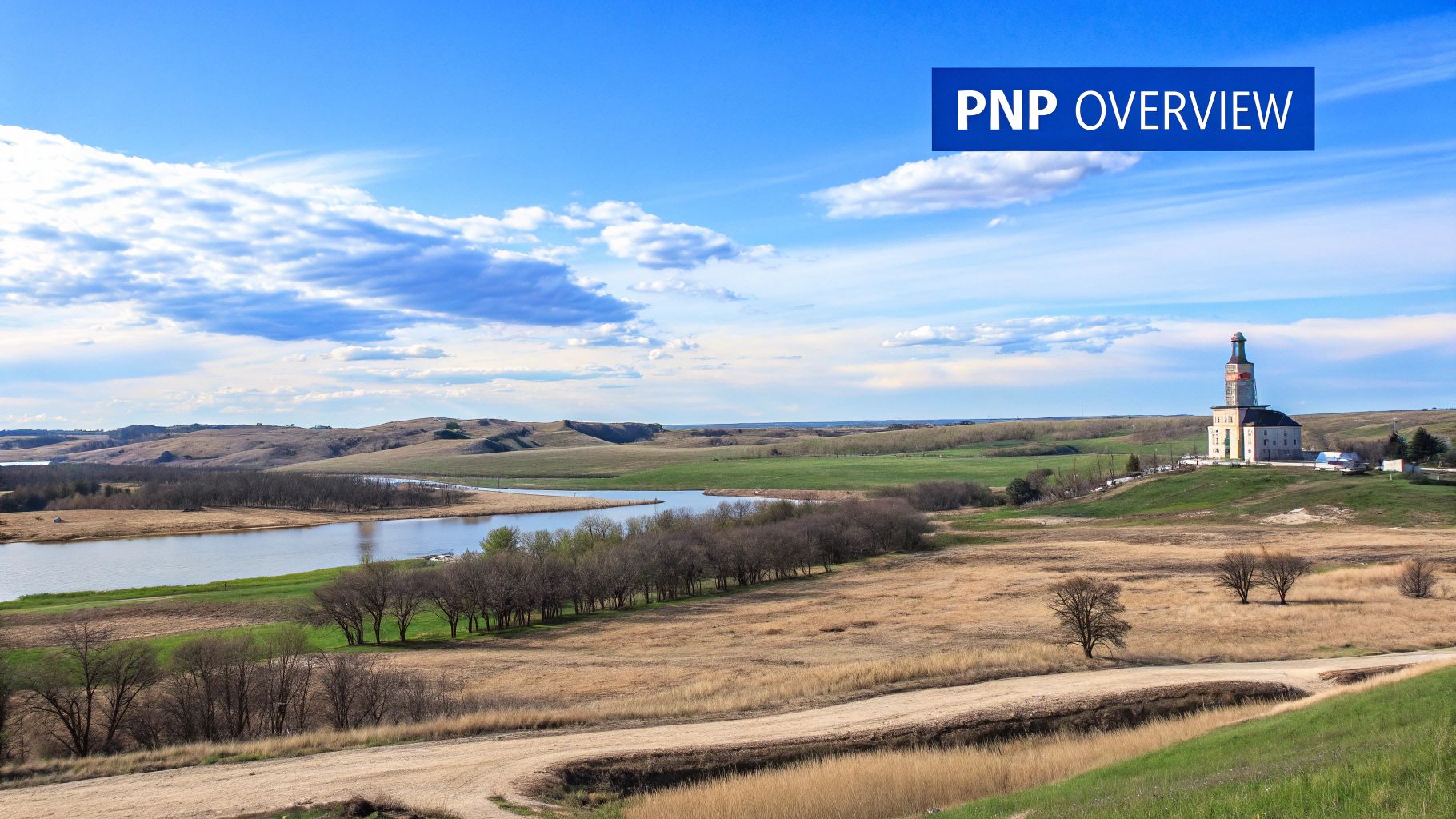Manitoba PNP Draw: Insider Tips & Strategies

Navigating the Manitoba PNP Draw System
The Manitoba Provincial Nominee Program (MPNP) provides a pathway to Canadian permanent residency for skilled workers and their families. It uses an Expression of Interest (EOI) system, a competitive selection process. Prospective immigrants submit profiles detailing their qualifications, which are then ranked using a points-based system. Higher scores increase the chances of receiving an invitation to apply, allowing Manitoba to select individuals best suited for its economy and communities.
The MPNP aims to attract individuals who can successfully integrate into the province’s social fabric and contribute to its economic growth. The EOI system is designed to streamline the selection process, ensuring a fair and transparent evaluation of applicants.
Understanding the EOI Process
Creating a detailed profile is the first step in the EOI process. This profile should highlight your education, work experience, language skills, and ties to Manitoba. This information is crucial for calculating your score, which determines your ranking among other candidates. Understanding your potential career path in Manitoba is also vital. Resources like Careers offer valuable insights into various career options.
The MPNP holds regular draws, inviting top-ranking candidates to formally apply for nomination. These invitations, or Letters of Advice to Apply (LAAs), are a significant milestone on the path to permanent residency. Receiving an LAA signifies that your profile has been assessed and deemed suitable for further consideration.
Enhanced vs. Base Nominations
The MPNP offers two primary nomination streams: Enhanced and Base. Enhanced nominations are connected to the federal Express Entry system. This offers expedited processing for those eligible for a federal program. Base nominations are processed independently, which might take a bit longer.
Both streams, however, ultimately lead to permanent residency in Manitoba. The best choice depends on your individual circumstances and eligibility for federal programs. Carefully consider your options to determine which stream aligns best with your goals and qualifications.
Draw Frequencies and Selection Criteria
Manitoba PNP draws are held regularly, often several times a month. The frequency and selection criteria vary based on Manitoba’s labor market demands. Some draws may prioritize candidates with specific skills or experience in high-demand occupations.
Staying informed about these criteria is essential for a successful application. Researching the province’s current labor market needs can provide valuable insights into the skills and occupations in demand. In 2024, the MPNP issued a remarkable 9,541 nominations, including 9,519 Skilled Worker nominations and 21 Business Investor Stream nominations. This demonstrates Manitoba’s ongoing commitment to attracting skilled workers. More detailed statistics are available here: https://immigratemanitoba.com/data/monthly-data-2024/

Cracking the Manitoba PNP Points Calculator
The Manitoba Provincial Nominee Program (MPNP) uses a points-based system, much like a game, to rank candidates in its Expression of Interest (EOI) pool. The goal? Achieve the highest score to win a nomination. Understanding this intricate system is key to maximizing your chances in the Manitoba PNP draw.
Deconstructing the Scoring Grid
The MPNP points grid assesses candidates across several key areas. Language proficiency is crucial, offering up to 125 points. A Canadian Language Benchmark (CLB) score of 8 or higher significantly boosts your score. Age also plays a role, with a maximum of 75 points awarded to those between 21 and 45 years old. Work experience, especially in Manitoba’s in-demand occupations, can earn you up to 175 points, and a recognized provincial license adds further value.
Your education contributes up to 125 points, with master’s and doctoral degrees earning higher scores. Adaptability, however, holds the most weight, with a potential 500 points. This underscores Manitoba’s focus on candidates likely to settle successfully. Strong Manitoba connections, like family ties, past work or study experience, or a valid job offer, are essential here. Finally, a risk assessment can deduct up to 200 points for factors that might hinder settlement. The MPNP’s EOI system ensures Manitoba attracts highly qualified immigrants. Learn more about the Manitoba points system: https://immigratemanitoba.com/notices/eoi-draw/
You can also check out our guide on calculating Canada PR points for a broader perspective on points systems in Canadian immigration.
To further clarify the Manitoba PNP points system, let’s examine the points breakdown in more detail.
Manitoba PNP Points Breakdown
This table outlines the maximum possible points for each assessment category in the Manitoba Provincial Nominee Program’s Expression of Interest system.
| Assessment Category | Maximum Points | Key Considerations |
|---|---|---|
| Language Proficiency | 125 | CLB 8 or higher significantly improves score |
| Age | 75 | Optimal range is 21-45 years old |
| Work Experience | 175 | Alignment with in-demand occupations is crucial |
| Education | 125 | Master’s and doctoral degrees earn higher points |
| Adaptability | 500 | Strong Manitoba connections are key |
| Risk Assessment | -200 | Factors hindering settlement can lead to deductions |
As you can see, adaptability and connections to Manitoba are the most important factors in the scoring grid. Language proficiency, age, work experience and education also play a role, but maximizing your adaptability score is key to a successful application.

The Power of Manitoba Connections
Connections to Manitoba significantly impact your score. Having close relatives in the province can substantially increase your points. Previous work or study experience demonstrates prior commitment and enhances your adaptability score. A job offer from a Manitoba employer is especially valuable, showcasing immediate employability.
Strategic Point Maximization
Successfully nominated candidates often strategically target specific point thresholds. Aiming for CLB 9, rather than just the minimum, unlocks additional points. Similarly, pursuing a master’s degree enhances your score more than a bachelor’s degree. This focused approach, combined with strong Manitoba connections, can be the deciding factor in a competitive PNP draw.
Manitoba PNP Draw Trends: What The Numbers Reveal

Analyzing recent Manitoba Provincial Nominee Program (MPNP) draw trends provides valuable information for those hoping to immigrate to Manitoba. These trends offer a snapshot of the current competitive landscape and can help you develop a strong application strategy. Understanding these trends is essential for maximizing your chances in the Manitoba PNP draws.
Invitation Volumes and Score Thresholds
A key trend to watch is the changing number of Letters of Advice to Apply (LAAs) issued in each draw. Some draws release a large number of invitations, while others are much more limited. The minimum score needed to receive an LAA, also known as the cutoff score, can also shift significantly between draws.
These fluctuations often depend on which specific streams are included in the draw and the overall qualifications of the applicant pool. Different MPNP streams also have unique score trends.
For example, the Skilled Worker Overseas stream frequently has higher cutoff scores than the International Education Stream. This difference underscores the importance of selecting the stream that best matches your individual skills and experience. Keeping a close eye on these trends will allow you to assess the competitiveness of your chosen stream and set realistic expectations.
Express Entry vs. Base Provincial Nominations
The Manitoba PNP offers two pathways to provincial nomination: Express Entry-linked and base provincial nominations. Express Entry nominations generally lead to faster processing, thanks to the efficiency of the federal Express Entry system. However, these nominations are often more competitive and may require a higher score.
Base provincial nominations, while potentially involving a longer processing time, can offer more options for those who may not meet the Express Entry requirements. The best pathway for you will depend on your personal situation and immigration goals. Carefully considering the pros and cons of each option is essential for a successful application.
The February 20, 2025 Manitoba PNP draw illustrates these trends in action. A total of 41 LAAs were issued, with the Skilled Worker Overseas stream requiring a minimum score of 711. This draw also included 7 LAAs for Express Entry candidates. The average processing time for MPNP applications is currently estimated at 8 to 10 months for approximately 80% of applicants. You can find more detailed statistics on the recent draw here: https://immigcanada.com/manitoba-pnp-draw-issues-41-itas-for-canada-pr/
To further illustrate the recent trends, let’s take a look at a table summarizing the draw results:
Recent Manitoba PNP Draw Results
| Draw Date | Stream | Invitations Issued | Minimum Score | Express Entry Linked |
|---|---|---|---|---|
| February 20, 2025 | Skilled Worker Overseas | 41 | 711 | No |
| February 20, 2025 | Skilled Worker Overseas | 7 | N/A | Yes |
| (This table showcases a simplified example based on the provided data. Actual draw results may include multiple streams and categories.) |
As the table suggests, the minimum score requirements can differ greatly depending on the stream and whether it’s linked to Express Entry. This reinforces the importance of strategic planning and selecting the right stream.
Stream Preferences and Candidate Profiles
Recent draws also indicate preferences for candidates with specific skills. The MPNP frequently prioritizes applicants with in-demand skills, particularly in sectors facing labor shortages. This focus on in-demand occupations is reflected in the selection of specific streams in various draws. For instance, a draw might focus primarily on healthcare professionals or individuals with expertise in information technology.
Researching Manitoba’s labor market needs and emphasizing relevant skills in your application can significantly enhance your chances of being selected. This targeted approach demonstrates your potential to contribute to Manitoba’s economy and aligns with the program’s overall objectives.
Choosing Your Ideal Manitoba PNP Stream
Navigating the many options within the Manitoba Provincial Nominee Program (MPNP) can be a daunting task. Understanding the specifics of each stream, however, is crucial for improving your chances in the Manitoba PNP draw. This section provides a clear comparison to help you identify the pathway best suited to your individual skills and immigration objectives. Your choice of stream can significantly impact your nomination process.
Skilled Worker in Manitoba Stream
This stream is designed for skilled workers with existing work experience in Manitoba. A valid job offer from a Manitoba employer is typically a requirement. The stream prioritizes applicants already contributing to the province’s economy. This existing connection to the local job market makes this stream attractive for those who have already settled in Manitoba.
Skilled Worker Overseas Stream
The Skilled Worker Overseas stream is geared towards skilled workers living outside of Canada. It provides a pathway to Manitoba based on an applicant’s qualifications and potential. While prior experience in Manitoba isn’t mandatory, demonstrable adaptability and strong ties to the province, such as family connections, can be advantageous. This stream creates opportunities for those seeking to relocate to Manitoba and begin their careers there.
International Education Stream
This stream provides a faster pathway for international graduates of Manitoba post-secondary institutions. Its focus on recent graduates aims to retain skilled professionals within the province. The streamlined process and specific education criteria make this a competitive yet attractive option for eligible applicants. You might be interested in: Relocating to Canada from Nigeria.
Business Investor Stream
The Business Investor Stream is designed for entrepreneurs and investors looking to establish businesses and contribute to economic growth in Manitoba. It requires a substantial investment and a detailed business plan. Unlike the skilled worker streams, this stream emphasizes business development and capital investment, making it suitable for those with entrepreneurial aspirations.
Comparing the Streams
To better understand the key differences between each stream, let’s compare their core features:
| Stream | Key Requirement | Manitoba Connection | Processing Time |
|---|---|---|---|
| Skilled Worker in Manitoba | Manitoba work experience & job offer | Existing employment | Generally faster |
| Skilled Worker Overseas | Demonstrated skills & adaptability | Beneficial, not mandatory | Can vary |
| International Education Stream | Manitoba education credentials | Recent graduation from a Manitoba institution | Typically faster |
| Business Investor Stream | Significant investment & business plan | Business establishment in Manitoba | Dependent on investment and business plan |
This table highlights the unique advantages and requirements of each stream, enabling you to make an informed decision. Choosing the right stream depends on your personal circumstances and long-term objectives.
Identifying Less Competitive Streams
While all Manitoba PNP streams are competitive, some might offer better opportunities depending on your profile. For example, the International Education Stream can be highly competitive due to specific eligibility requirements and a smaller applicant pool. However, focusing on in-demand occupations that are less commonly pursued might improve your chances in certain draws.

Thorough research and careful planning are essential for navigating the Manitoba PNP. Selecting the right stream, based on your qualifications and Manitoba’s current needs, significantly influences your likelihood of success. Analyzing current draw trends and understanding the points grid offer further insight into the competitive landscape. This strategic approach will help optimize your profile and position you for success within the Manitoba PNP draw system.
Boosting Your Manitoba PNP Score: Proven Tactics
Want to elevate your Manitoba Provincial Nominee Program (PNP) profile from average to exceptional? This section delves into proven strategies to boost your score and enhance your chances in the Manitoba PNP draw. We’ll explore practical approaches based on the experiences of successful nominees and insights from immigration experts.
Mastering Language Proficiency
Language proficiency is fundamental to a successful PNP application. Even a slight improvement in your Canadian Language Benchmark (CLB) score can significantly impact your overall points. Aiming for CLB 9 or higher can substantially increase your score compared to simply meeting the minimum requirements.
- Targeted Preparation: Focus on specific areas of the language test requiring improvement. Regular practice with sample tests and utilizing language learning resources will be beneficial.
- Immersive Experiences: Consider participating in immersive language programs or engaging in daily conversations in English or French. This can enhance your fluency and comprehension skills.
A higher CLB score not only improves your points but also demonstrates your ability to integrate into Manitoba’s diverse communities.
Optimizing Your Education Credentials
Your educational background is a key factor in the Manitoba PNP points system. Ensure your credentials are accurately assessed to maximize your points. A master’s or doctoral degree can significantly boost your score compared to a bachelor’s degree.
- Credential Assessment: Secure an Educational Credential Assessment (ECA) report. This verifies that your international degree is equivalent to a Canadian degree, ensuring accurate representation in the points system.
- Further Education: Consider pursuing further education in Canada or obtaining a Canadian degree, if possible. This can increase your points and broaden your career opportunities in Manitoba.
Accurately representing your educational background strengthens your profile and effectively highlights your qualifications.
Showcasing Relevant Work Experience
Effectively documenting your work experience is vital. Clearly articulate your responsibilities and achievements in past roles, emphasizing experience relevant to Manitoba’s in-demand occupations.
- Detailed Documentation: Provide thorough documentation, including reference letters and employment records. Clearly outline your employment duration, job titles, and key responsibilities.
- Skill Alignment: Highlight skills aligned with Manitoba’s labor market needs. Researching in-demand occupations allows you to tailor your application and showcase valuable skills.
This focused approach demonstrates your potential economic contribution to Manitoba and strengthens your application.
Cultivating Strong Manitoba Connections
Manitoba connections carry significant weight in the PNP points system, offering up to 500 points. Building genuine connections within the province can dramatically improve your application’s success.
- Family Ties: Highlighting close relatives residing in Manitoba can significantly boost your points. Ensure you provide documentation to verify these relationships.
- Past Experience: Previous experience in Manitoba, such as work or study experience, demonstrates your adaptability to the province.
- Community Involvement: Documenting volunteer work or participation in community events during visits to Manitoba shows your interest in active community engagement.
Strategically developing these connections is essential for maximizing your points and demonstrating your commitment to Manitoba. These connections offer a distinct advantage. By focusing on these strategies, you can significantly enhance your Manitoba PNP application and increase your likelihood of receiving an invitation to apply for Canadian permanent residency.
Post-Nomination Success: Turning Invitation Into Residency
Receiving a Manitoba Provincial Nominee Program (MPNP) nomination through a Manitoba PNP draw is a significant milestone. However, it’s not the final destination on your journey to Canadian permanent residency. Think of it as reaching base camp on your climb to the summit. You’ve made great progress, but there’s still a challenging ascent ahead. This section guides you through the essential steps to successfully navigate the post-nomination phase.
Preparing a Stellar Submission Package
After receiving your Letter of Advice to Apply (LAA), the real work begins. You’ll need to prepare a comprehensive submission package for both provincial and federal review. This package demands meticulous attention to detail and includes several vital components. A well-prepared package can significantly speed up the process, while errors or omissions can cause frustrating delays or even rejection.
Document Authentication: Ensure all necessary documents, such as educational transcripts and birth certificates, are authenticated according to the MPNP guidelines. This typically involves getting official certifications from the original issuing authorities.
Medical Examinations: You’ll need to undergo the required medical examination from a physician authorized by Immigration, Refugees and Citizenship Canada (IRCC). This assessment is crucial for demonstrating your admissibility to Canada based on health criteria.
Financial Proof: Provide sufficient proof of funds to show your ability to support yourself and any accompanying family members after arriving in Manitoba. This documentation needs to clearly outline your available financial resources and meet the specified requirements. To strengthen your application and ensure your qualifications align with Manitoba PNP requirements, consider undergoing thorough background verification.
Each element of your submission package plays a vital role in demonstrating your preparedness for life in Manitoba. Meticulous preparation is key to a successful application.
Managing the Transition: Awaiting PR Approval
The waiting period between submitting your application and receiving permanent residency approval requires careful planning. While this transition phase can feel like limbo, a clear strategy can make it much smoother. It’s similar to preparing for a long voyage – you need to anticipate your needs and pack accordingly.
Work Permit Options: Explore available work permit options to maintain employment continuity while your PR application is being processed. A valid work permit allows you to continue working and contributing to Manitoba’s economy.
Family Relocation Planning: If you have family members joining you, start planning their relocation. Researching housing, schools, and community resources in Manitoba will simplify the transition and help your family settle in comfortably.
Planning these aspects in advance minimizes disruption and facilitates a smoother transition.
Timeline Expectations and Application Tracking
Understanding the typical processing timelines and having a strategy for tracking your application’s progress is essential. This keeps you informed and prepared to address any unforeseen circumstances promptly.
Realistic Timeframes: MPNP application processing times can vary. Stay informed about current processing times to set realistic expectations and manage your timeline effectively.
Active Tracking: Use online portals or official communication channels to monitor your application status. Proactive tracking lets you manage the process effectively and respond promptly to any requests from immigration authorities.
Preparing for Your Move to Manitoba
Once your permanent residency is approved, it’s time to finalize your move to Manitoba. Several key steps will ensure a smooth transition into your new life.
Pre-Arrival Services: Utilize pre-arrival services offered by the MPNP and other organizations. These resources offer valuable information on settling in Manitoba, finding employment, and accessing essential community resources.
Community Connections: Begin connecting with the Manitoba community before you arrive. Engaging with local organizations and groups can build a support network and facilitate a more seamless integration into your new surroundings. You might be interested in researching resources like Applying for PR in Canada.
Careful preparation and a proactive approach are essential for navigating the post-nomination phase. Following these guidelines will help you transition smoothly and confidently begin your new life in Manitoba. Ready to start your Canadian immigration journey? JapaChat, Nigeria’s leading AI immigration expert platform, offers personalized guidance and support at every stage. Explore JapaChat today! and learn how we can help you achieve your immigration aspirations.

Leave a Reply